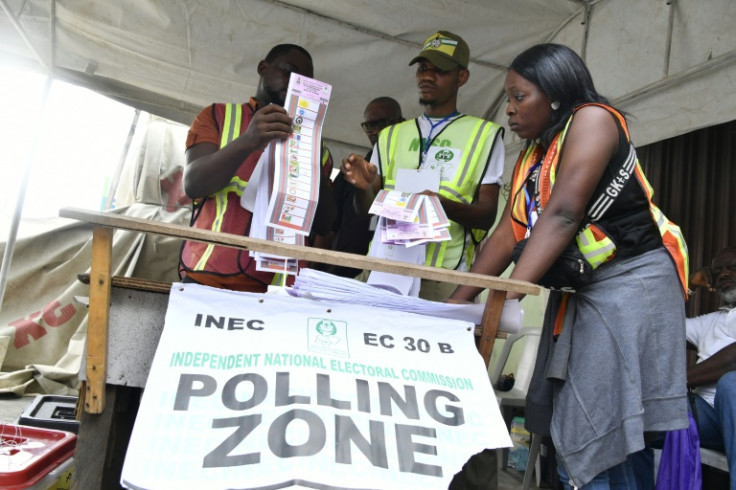Results Stream In After Tense Local Elections In Nigeria

Lagos governor Babajide Sanwo-Olu was in an early lead Sunday evening in his bid for re-election, as Nigeria counted votes following local elections marred by violence and vote buying.
Governors are powerful positions in Nigeria, with some controlling state budgets larger than those of several African nations.
Saturday's election for 28 governors and more than 900 state assembly lawmakers took place three weeks after the governing party won a presidential race that opposition groups said was rigged.
Outsider Peter Obi of the Labour Party (LP) caused a stir on February 25 by winning the most votes in Lagos, considered the fiefdom of president-elect Bola Tinubu of the ruling All Progressives Congress (APC).
But nationwide Obi came in third position, after Atiku Abubakar of the Peoples Democratic Party (PDP) -- both are contesting the results in courts.
They key question on Saturday was whether Obi's growing popularity, especially with Nigeria's youth, would translate at the local polls.
As results were gradually announced by the Independent National Electoral Commission (INEC) on Sunday, putting Sanwo-Olu ahead in Lagos, the LP candidate for governor in the state, Gbadebo Rhodes-Vivour, took to social media.
"I am convinced beyond any doubt that the results being released by INEC do not represent the wishes of majority of peaceful Lagosians," Rhodes-Vivour said on Twitter.
So far, the APC has won the governorship races in Ogun, Kwara, Jigawa, Gombe and Yobe, while the PDP has won in Oyo and Akwa Ibom.
Other competitive contests where results are still pending took place in southern Rivers and northern Kano, while northeast Adamawa could see the election of Nigeria's first woman governor.
With President Muhammadu Buhari stepping down in May after two terms, many hoping for change were disappointed in the way the voting was conducted last month, a sentiment that could have impacted the local contests.
Voters and opposition parties claimed that technical mishaps allowed for ballot manipulation, which the electoral commission has denied.
After observing Saturday's poll, the Centre for Democracy and Development (CDD) noted in parts of the country "a sense of discouragement that due to the unfavourable outcome of the presidential election 'there is no point' of coming out to vote".
Despite signs of low turnout, observer group Yiaga Africa said it had recorded "significant improvement in the management of election logistics" on Saturday.
Polling units mostly opened on time and both the biometric registration machines and online portal to view results functioned relatively well, both observer groups said.
Violence was recorded across several states however, with thugs showing up at polling units to intimidate voters and in some cases destroying electoral material.
In southeast Imo State, where armed separatist groups are active, a group of ad hoc electoral staff were taken hostage on Saturday morning, and while they were quickly rescued, election material went missing.
In Lagos, "in the Lagbasa and Ado primary school in Ajah, there were reports of voters being flogged", according to the CDD.
Amnesty International warned that these tactics were being "used to scare people from voting".
"Many ended up with severe injuries... This is unacceptable and must be investigated thoroughly," the rights group said on Twitter.
As a result of tensions, voting was postponed in some sites -- in Eti Osa district of Lagos and in Asari-Toru and Degema districts of Rivers State -- and were scheduled to take place on Sunday.
"Processes were disrupted by actors over whom we have little or no control," said INEC official Festus Okoye, who condemned the violence on Sunday evening.
He also said that "allegations of voter inducement, harassment and manipulation of results will be reviewed and addressed."
Instances of vote buying was more rampant than during the presidential election, observers reported earlier in the day.
Party agents were seen giving out 1,000 naira (about two dollars) in exchange for votes, as well as provisions of spaghetti, fabric and alcohol, Yiaga Africa said.
The Economic and Financial Crimes Commission said on Saturday that it had arrested "no fewer than 65 persons... for alleged voter inducement".
© Copyright AFP 2025. All rights reserved.





















